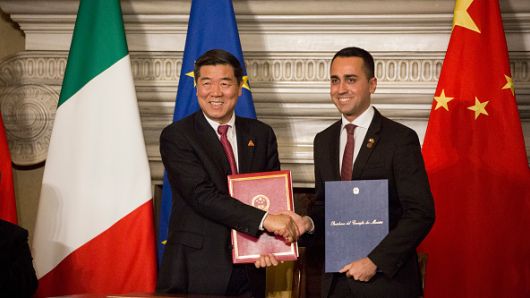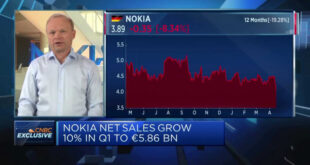
Christian Minelli | NurPhoto via Getty Images
Italy, Rome: Chairman of China’s National Development and Reform Commission (NDRC), He Lifeng (L) and Italy’s Labor and Industry Minister and deputy PM Luigi Di Maio sign partnership agreements during a ceremony at Villa Madama in Rome on March 23, 2019 as part of China’s president two-day visit to Italy.
The raft of investment deals that Italy’s leadership has just signed with Beijing as part of its massive Belt and Road program is “nothing to worry about,” Italian Deputy Prime Minister Luigi Di Maio told CNBC.
“We are maximizing all precautionary measures, and I want to tell the U.S., and I will tell them as well in next week’s visit, that they are our allies, and that we understand their concerns. But the contents of the MOU (memorandum of understanding) that we are signing tomorrow contains nothing for them to worry about, nothing relating to 5G or any agreement on strategic telecommunications,” Di Maio told CNBC’s Joumanna Bercetche on Friday just before
Italy on Saturday became the first European Union and Group of 7 country to join China’s expansive Belt and Road Initiative (BRI), drawing concern from the U.S. and European allies.
Chinese President Xi Jinping’s visit to Rome saw a total of 29 deals signed, altogether worth 2.5 billion euros ($2.8 billion). They were focused on agricultural, finance and energy sectors, and opened up new access to the Chinese market for major Italian energy and engineering firms.
Western critics warn of Chinese debt traps and describe the initiative as a ploy to expand geopolitical and strategic influence, while Beijing pursues links to Europe and Africa via South Asia and the Middle East to expedite and increase the export of Chinese goods.
China and the U.S. are in the process of negotiations to end their protracted trade war, while Washington tries to combat what it sees as a security threat posed by Chinese telecommunications companies, particularly its largest, Huawei. The U.S. says Huawei’s role in building 5G internet infrastructure around the world could allow the Chinese government to spy on users, a claim Beijing rejects.
 EU News Digest Latest News & Updates
EU News Digest Latest News & Updates


